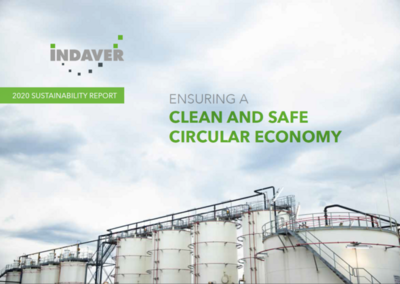People
We are a technology and knowledge-driven company. Our staff use their knowledge to design the technological innovations and service provision concepts that we use to resolve the complex issues around waste. With our sustainable employment programme, we ensure that they can continue working with plenty of energy and motivation, now and in the future.
Safety is the common thread that runs through everything we do. We maintain an open dialogue with each other, so we can look out for unsafe situations. Prevention is always better. So, we work safely, or we don't work at all.
Planet
We see it as our society’s duty to contribute to the habitability of our earth and to make a concrete contribution to the transition of waste into a pure and safe raw material. In our high-tech facilities, we recover valuable materials, sometimes down to a molecular level. During our treatment processes, we generate renewable energy which we use ourselves and supply to third parties.
We destroy components that are hazardous to the living environment and which must not end up in the materials loop, or we store them safely.
For all of our activities, we limit our impact on our environment as much as possible.
Prosperity
We believe that the circular economy is the way to share prosperity and well-being evenly between the global population. The terms circular and economy go hand-in-hand. Thanks to a stable, financial position we can also invest in sustainability.
We work structurally and systematically to improve our service provision, efforts and processes. Further digitalisation plays an important role in that.
To increase our treatment capacity, we are working from our long-term vision on the expansion of our existing facilities and on the construction of new, innovative and sustainable facilities. The acquisition of existing facilities strengthens our position as a strong player in sustainable waste management.
Partnerships & Projects
In the circular economy, several parties are associated with each other. So, it goes without saying that we collaborate with universities, research institutions, industries and local authorities. We share knowledge and network, but we can also match supply to demand. Such collaborative projects lead to innovative results. Such as the Plastics2Chemicals project, which, following a successful pilot, is developing into a test installation.
The launch of the ECLUSE steam network is also a successful example of a wide collaboration; companies and organisations are successfully preventing 100,000 tonnes of CO2 emissions every year.
Sustainable development goals
In our sustainability report, we refer specifically to 9 of the 17 SDGs, the United Nations’ sustainable development goals. Icons in the report indicate how our activities fit in with one or more of these goals.
Downloads
You can consult the 2019 sustainability report through our website or download it as a PDF. We also have a concise flyer for you to download, which contains a few key figures.
